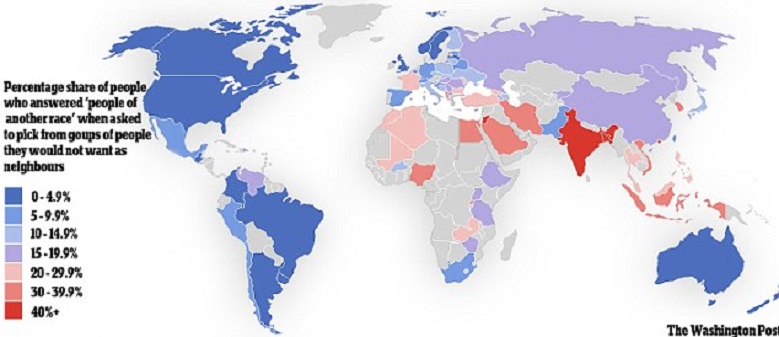Racism in India
This is a collection of articles archived for the excellence of their content. |
Extent of racism in India
Indpaedia has a serious problems with the survey cited below. More than 99.99 per cent of Indians have never had to live with a person of another race next door. Therefore, the Indian respondents’ answers were hypothetical.
People from north-eastern India belong to the Mongoloid race. In the Indian plains they are sometimes not treated with the respect that they deserve. But they are never denied houses on rent merely because of their race. All members of Indpaedia’s original uploading team and more than 75 per cent on the uploading team in 2017 belong to the Mongoloid race. Therefore, we should know.
The few hundred, perhaps a few thousand, African nationals (other than diplomats and MNC staff) living in India have, indeed, been confined to lower-middle class neighbourhoods like Delhi’s Khirkee. Less than 0.01 per cent of Indians are ever likely to have an African national as a neighbour. Therefore, as far as race is considered the survey’s findings about India are hypothetical.
The USA, cited as the world’s most liberal in the matter of neighbours, has the world’s worst record when it comes to white policemen killing African-American youths, who later turn out to be non-criminals, in fake ‘encounters.’ Pakistan, which violently drove its entire Hindu, Sikh and Jain communities out, comes out as a tolerant country. Bangladesh, which has a substantial Hindu community, is shown as intolerant.
Then why has Indpaedia uploaded this survey at all?
i) There are several recorded cases of Indians, especially in well-to-do Mumbai and Gujarat refusing to rent out their own houses, or flats in their apartment complex or housing society, to people belonging to another religion.
ii) True, this writer has seen some African nationals taking turns to peddle drugs in Saket. True, some African youths smashed up a glass-wall in Delhi’s Hotel Samrat, which this writer was associated with. True, the genteel waiters of many upmarket Delhi restaurants live in fear of taller and more muscular African nationals. However, do such incidents justify tarring all African nationals in India with the same brush?
iii) A survey in the late 1960s suggested that some Indian sub-castes were the world’s 2nd most racist [i.e. casteist] people, after South African whites. Therefore, should we Indians not introspect as to whether we do have a problem?
This set of articles was uploaded in the wake of the attacks on some African nationals in Bengaluru in March 2017.
- Jordan and India named the world's least tolerant countries
- U.S., Britain, Canada and South America are among the least racist
- Survey asks people if they would want neighbours of a different race
- Britain is one of the most racially tolerant countries on the planet, a survey claims.
The global social attitudes study claims that the most racially intolerant populations are all in the developing world, with Jordan and India in the top five.
By contrast, the study of 80 countries over three decades found Western countries were most accepting of other cultures with Britain, the U.S., Canada and Australia more tolerant than anywhere else.
The data came from the World Value Survey, which measured the social attitudes of people in different countries, as reported by the Washington Post.
The survey asked individuals what types of people they would refuse to live next to, and counted how many chose the option 'people of a different race' as a percentage for each country.
Researchers have suggested that societies where more people do not want neighbours from other races can be considered less racially tolerant.
The country with the highest proportion of 'intolerant' people who wanted neighbours similar to them was Jordan, where 51.4 per cent of the population would refuse to live next to someone of a different race.
Next was India with 43.5 per cent.
Racist views are strikingly rare in the U.S., according to the survey, which claims that only 3.8 per cent of residents are reluctant to have a neighbour of another race.
The Middle East, which is currently dealing with large numbers of low-skilled immigrants from south Asia, seems to be a hotbed of racial tension, however.
Europe is remarkably split - the west of the continent is generally more tolerant than the east, but France is a striking outlier with 22.7 per cent of the French rejecting neighbourhood diversity.
Some have pointed out problems in the survey data, claiming that because the polls span a long period of time they are an unreliable guide to current attitudes.
However, a more serious flaw could be the fact that in most Western countries racism is so taboo than many people will hide their intolerant views and lie to the questioners.
Max Fisher of the Washington Post suggested that maybe 'Americans are conditioned by their education and media to keep these sorts of racial preferences private, i.e. to lie about them on surveys, in a way that Indians might not be'.
THE LEAST RACIALLY TOLERANT COUNTRIES
40% + (of individuals surveyed would not want a person of another race as a neighbour) India, Jordan
30 - 39.9% Egypt, Saudi Arabia, Iran, Vietnam, Indonesia, South Korea
20 - 39.9% France, Turkey, Bulgaria, Algeria, Morocco, Mali, Zambia, Thailand, Malaysia, The Philippines, Bangladesh, Hong Kong
THE MOST TOLERANT COUNTRIES
0 to 4.9% United States, Canada, Brazil, Argentina, Colombia, Guatemala, Britain, Sweden, Norway, Latvia, Australia, New Zealand
5 - 9.9% Chile, Peru, Mexico, Spain, Germany, Belgium, Belarus, Croatia, Japan, Pakistan, South Africa
10 - 14.9%Finland, Poland, Ukraine, Italy, Greece, Czech Republic, Slovakia
15 - 19.9% Venezuela, Hungary, Serbia, Romania, Macedonia, Ethiopia, Uganda, Tanzania, Zimbabwe, Russia, China
Source: World Values Survey
